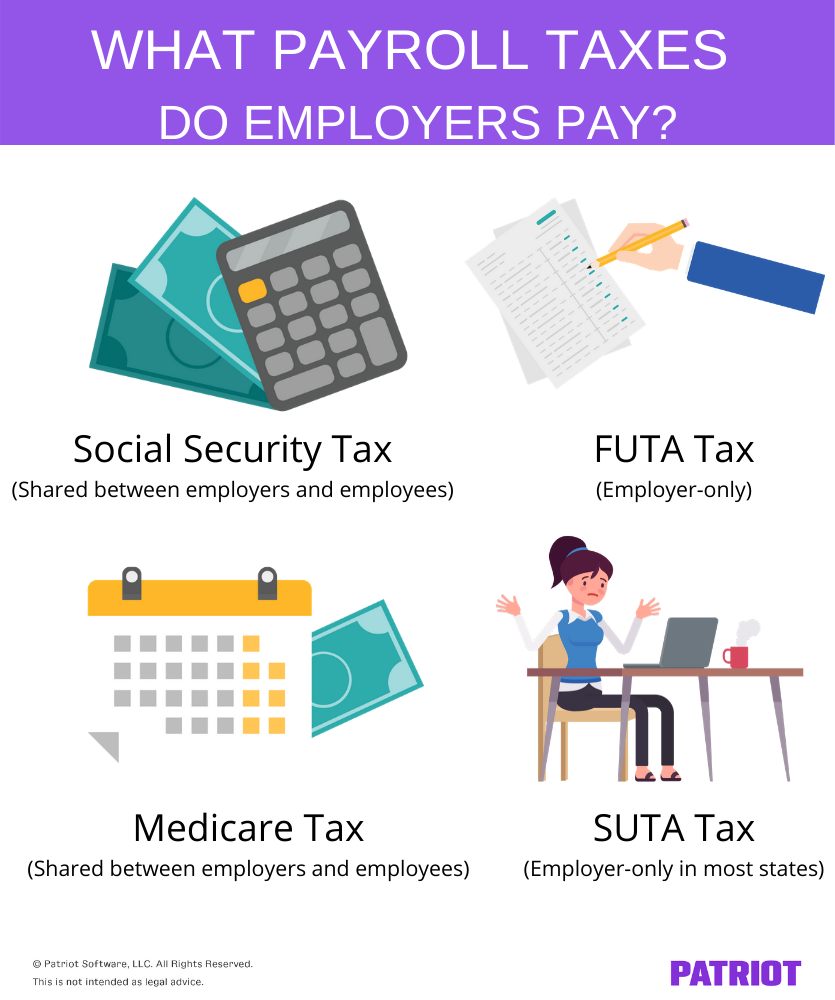You know that you’re responsible for managing payroll for your employees. You’re also likely familiar with payroll withholdings, including taxes and non-tax deductions. But, what about your employer payroll liabilities? Do you know what the payroll taxes paid by employer are?
To stay compliant with the IRS and Department of Labor, you need to know what is the employer portion of payroll taxes. Withholding the employer portion of payroll taxes from your employees’ wages is illegal. And, failing to pay your employer tax liability can lead to IRS penalties.
So, are you ready to dive into your employer payroll tax responsibility?
About payroll taxes
Payroll taxes are mandatory contributions that both employees and employers make. There are a number of payroll-related taxes, including:
- Federal income tax
- State income tax
- Local income tax
- Social Security tax
- Medicare tax
- Federal unemployment tax
- State unemployment tax
- State-specific taxes (e.g., Oregon transit tax)
There are both employee taxes paid by employer as well as taxes paid by employees. And, there are taxes that both employees and employers pay.
Payroll taxes paid by employer
Do employers have to pay taxes on employees? Yes, yes they do. And here are the ones that employers are responsible for:
- Social Security tax (shared between employers and employees)
- Medicare tax (shared between employers and employees)
- Federal unemployment tax (employer only)
- State unemployment tax (employer only in most states)

What about income taxes? Do employers pay income tax for employees? No, employers do not pay income taxes for their employees. Employees are solely responsible for income tax payments, which employers must withhold.
Now that you know which taxes are your responsibilities, you might be wondering, OK, so how much payroll tax will I pay? That answer depends. Your payroll tax liability varies based on the number of employees you have, how much you pay those employees, and where your business is located.
If you want to know how much your payroll tax liability is, familiarize yourself with how to calculate payroll taxes for employer share below.
Social Security tax
Both employers and employees pay Social Security tax. So, what percentage of payroll taxes is paid by employer for Social Security?
Employers must pay a flat rate of 6.2% of each employee’s wages for Social Security tax. Employees pay a matching 6.2%.
Stop paying the 6.2% Social Security tax rate if an employee earns above the Social Security wage base. For 2020, the SS wage base is $137,700. Likewise, stop withholding the employee’s portion when they earn above this threshold.
Let’s say an employee’s biweekly gross pay is $2,000. They don’t have any pre-tax deductions that are exempt from Social Security tax. To calculate your employer SS tax liability, multiply $2,000 by 6.2%. You must pay $124 for the employer portion of Social Security tax (and withhold $124 for the employee portion).
Medicare tax
Medicare tax is another out-of-pocket payroll tax employers share with employees. The Medicare tax rate is 1.45% of each employee’s wages. Employees also pay 1.45% on their wages.
Unlike Social Security tax, there is no Medicare wage base. There’s actually an additional Medicare tax that employees are responsible for after the employee earns a certain amount, but this does not affect your employer liability. Employers always pay 1.45% of an employee’s wages.
Say an employee’s biweekly gross pay is $2,000 again. Multiply $2,000 by 1.45% to determine how much you will pay. Your employer liability is $29 (and withhold $29 from employee wages for their portion).
FUTA tax
FUTA (Federal Unemployment Tax Act) tax is an employer-only tax. Unlike Social Security and Medicare taxes, you do not withhold a portion of FUTA tax from employee wages.
Your federal unemployment tax rate depends on your state. FUTA tax is 6% of the first $7,000 you pay each employee during the year. But, most employers receive a FUTA tax credit that lowers their FUTA tax rate to 0.6% on the first $7,000 employees earn. Your tax rate is 0.6% unless your business is in a credit reduction state.
If your FUTA tax rate is 6%, the maximum amount you’ll pay per employee is $420 ($7,000 X 0.06). If your FUTA tax rate is 0.6%, the maximum amount you’ll pay per employee is $42.
SUTA tax
SUTA (State Unemployment Tax Act) tax is another employer-only tax. However, employees are responsible for contributing to SUTA tax payments in Alaska, New Jersey, and Pennsylvania.
This type of unemployment insurance tax goes to the state. Each state sets a different SUTA tax rate, in case you’re wondering What is my state unemployment tax rate? There is also a SUTA tax wage base that varies by state.
How much payroll tax will I pay?
Here’s a Q & A recap of your employer payroll tax responsibilities:
- Do employers have to pay taxes on employees?
- Yes
- What are the payroll taxes paid by employer?
- Social Security, Medicare, FUTA, and SUTA taxes
- What percentage of payroll taxes is paid by employer?
- Social Security tax: 6.2%
- Medicare tax: 1.45%
- FUTA tax: 0.6% – 6%
- SUTA tax: varies by state
Never calculate payroll taxes again. Patriot’s online payroll will automatically calculate taxes so you can keep your time and money for what matters most: your small business. Start your free trial today!
This is not intended as legal advice; for more information, please click here.



